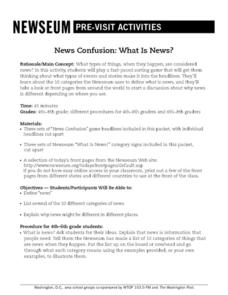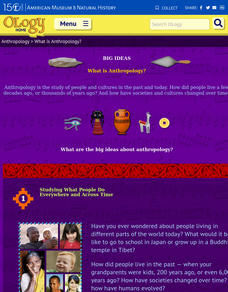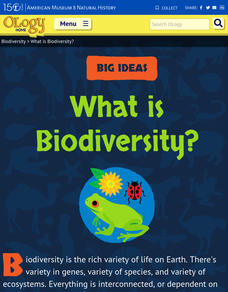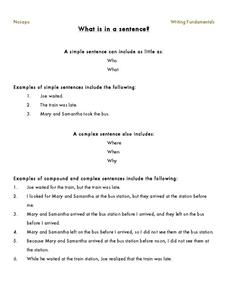Curated OER
Autism - What Is It?
High schoolers investigate the symptoms of autism spectrum disorders, and compare expected child development with development that may indicate a diagnosis of these disorders. The final project for the lesson is the creation of posters...
Curated OER
Data and Probability: What is the Best Snack?
For this math/nutrition lesson, the nutritional value of 3 snack foods is recorded on a data chart and represented on a bar graph. Students analyze and compare information, construct data charts and related bar graphs, and draw...
Film Foundation
To Kill a Mockingbird: What Is a Movie?
The challenge film makers face when creating a film based on a novel or nonfiction text is the focus of a interdisciplinary resource that uses To Kill a Mockingbird to teach viewers how to read the visual images of film. A...
American Chemical Society
What is Density?
Density: the reason a giant pumpkin will float, but a tiny cranberry won't. Lesson begins with a demonstration of two of the same-sized cubes having different densities. Then pupils take eight cubes, each of the same size, and have to...
Creative Chemistry
What is the Percentage of Copper in "Copper" Coins?
Whether in the UK or the US, the mass of the copper in a copper alloy penny can be determined. If you are in the US, note that on the lab sheet, a penny is identified as a "1p piece." The penny is dissolved by young chemists in nitric...
Illustrative Mathematics
What is a Trapezoid? (Part 2)
This collaborative activity investigates the meaning of a trapezoid and a parallelogram. It begins by presenting two different definitions of a trapezoid. Learners are to reason abstractly the difference between the two definitions and...
Newseum
News Confusion: What Is News?
Use headlines to help your learners understand what news is. First, present a list of categories to your class. Then instruct small groups to play a game in which they sort headlines into the categories. Discuss the result and examine...
University of the Desert
What Is Extremism?
By participating in discussions using prompts and statements provided in the lesson plan plan, learners identify the concept of extremism and consider what causes violent acts of extremism in the modern...
Cornell University
What is IPM?
Discover what a pest is and how to identify one with a lesson that looks closely at our outside world and taxonomy. Scholars investigate insects and plants to practice their identification skills, take a survey, and explore the...
American Museum of Natural History
What is Anthropology
A colorful resource introduces learners to the four major fields of anthropology: cultural anthropology, linguistic anthropology, biological anthropology, and archaeology. Explanations are provided for what each field studies, the kinds...
Polar Trec
What Is My Footprint?
How do one's habits and lifestyle choices affect the environment? Through a short online survey, learners will calculate their own carbon footprints then determine how to reduce their impact on the environment through simple steps, such...
Teach Engineering
What is Going on with Grandma?
Pupils individually determine what they need to know about osteoporosis and how they will find that information. They share their thoughts with a partner before moving on to share with the class. The class arrives at a list of a set of...
Lovewell Press.
What Is Honesty?
What else can honesty mean besides "not lying"? Using this activity, your learners will consider what actions are most truthful and honest given a variety of real-world scenarios and activities.
TED-Ed
What is the World Wide Web?
Did you know that the World Wide Web and the Internet are not the same thing? Did you know that Tim Berners-Lee is considered the father of the Web? Networks, web servers, web hosts, website addresses, domain names, web languages,...
American Museum of Natural History
What is Biodiversity?
Not all dogs are the same just like not all finches are the same. An interactive online lesson helps individuals learn about the causes and limitations to biodiversity. The clickable sections describe the basics of the genetics of...
American Museum of Natural History
What is Marine Biology?
A marine environment covers the majority of the earth but is arguably the least understood. Teach young scientists about the characteristics of oceans and ocean species using an interactive online lesson. The in-person or remote learning...
Nosapo
What Is in a Sentence, Paragraph, and Story?
Language arts is made up of many parts. Learners review the parts of a sentence, as well as how to make a simple sentence into a complex sentence, before examining full paragraphs and identifying the topic, body, and concluding sentence...
Baylor College
What is Air? Pre-Assessment
First, estimate existing knowledge about air with a class discussion. Then, hand out a 10-question pre-assessment quiz to record how much pupils know to compare to their knowledge later. This will also give mini meteorologists the...
Alcohol Education Trust
Talk About Alcohol: What is BAC (Blood Alcohol Concentration)?
Educate your class about blood alcohol levels by combining health with math practice. Class members read a little bit about blood alcohol concentration and then solve some problems related to determining alcohol levels and alcohol...
Wind Wise Education
What is the Cost of Inefficiency?
What does it cost to keep the lights on? Through a hands-on activity, class members use a watt meter and determine the amount of energy different types of light bulbs use. The class then determines the financial and environmental...
Teach Engineering
What is GIS?
Is GIS the real manifestation of Harry Potter's Marauders Map? Introduce your class to the history of geographic information systems (GIS), the technology that allows for easy use of spatial information, with a resource that teaches...
Curated OER
What is culture?
What is culture? Define culture, artifacts, subcultures, and multiculturalism with your class. This presentation provides a definition, example, and image of each facet of culture.
Film Foundation
Mr. Smith Goes to Washington: What Is a Movie?
Watching is not the same as seeing. Transform viewers from passive watchers to active students of film with this 34-page packet, filled with lessons and activities that use Mr. Smith Goes to Washington to examine the technology, the...
Curated OER
Functional Groups ~ What is the Family Name?
These 37 slides start with definitions of six types of functional groups, their molecular structure, and multiple examples or each. During the rest of the presentation, organic chemistry learners are given an opportunity to practice...
Other popular searches
- What Is Inauguration
- What Is an Autobiography
- What Is Veterans Day
- What Is Democracy
- What Is Science
- What Is Gravity
- What Is Algebraic Expression
- What Is a Memoir
- What Is Culture
- What Is Anthropology
- What Is Contemporary Music
- What Is Home Economics























